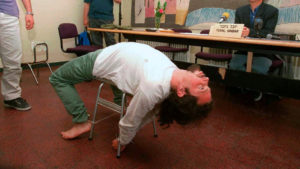Would we know if Palestinians were being tortured by the Shin Bet?

Demonstration of the Shin Bet torture method known as ‘banana b’kiseh’
Yonah Jeremy Bob writes in The Jerusalm Post:
A convergence of two cases, one only now being fully revealed, is drawing into question whether new oversight mechanisms over the Shin Bet (Israel Security Agency) are failing.
The known case concerns a Palestinian who was almost killed during a Shin Bet interrogation on September 28. He is not a sympathetic figure. Samer Arbid was being interrogated by the Shin Bet for his suspected involvement in the murder of Rina Shnerb in August, as well as other potential terror attacks he was allegedly planning. Sympathetic or not, the High Court of Justice has declared torture of detainees illegal since 1999 – even for terrorists.
The Justice Ministry’s oversight czar, who is reviewing the case, has not even produced preliminary findings after 10 weeks, which may be a symptom of a larger problem. Most people would consider hospitalization and almost dying to be the results of an interrogation that went too far: torture.
This is an important fact to state since the same 1999 High Court opinion prohibiting torture, in the same breath, permits the Shin Bet to use “moderate physical pressure” to stop a potential “ticking bomb” terror attack.
…. ….
ANOTHER CASE involves a Palestinian known as “N” (to protect his identity) who filed a complaint against the Shin Bet interrogators alleging torture, on December 29, 2014. The complaint says that N lost consciousness three times from being beaten, including on intimate parts of his body. Usually, the investigator or the courts decide that the worst allegations of torture are exaggerations. They usually also conclude that whatever moderate physical pressure did take place was justified to save civilian lives from future terror attacks. Maybe that is true in the case of N as well, and maybe not. But right now, no one knows because, almost five years later, the oversight unit has not decided.
